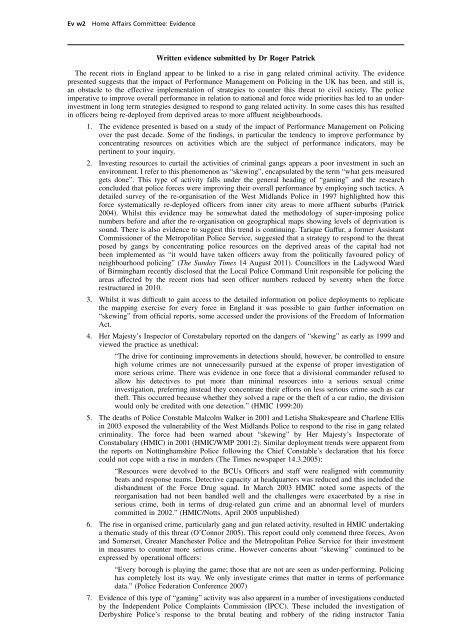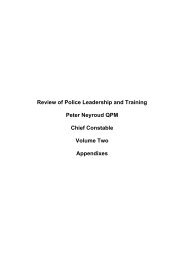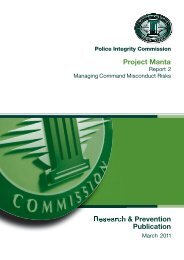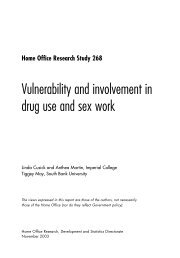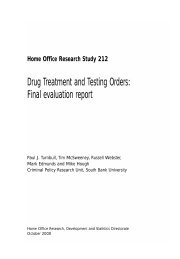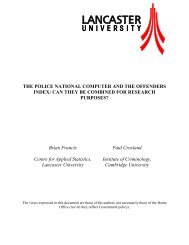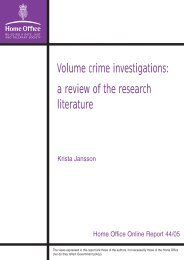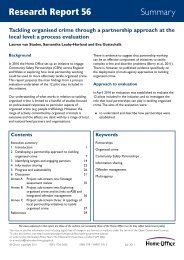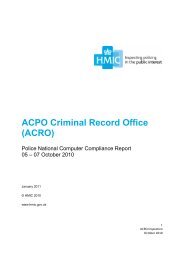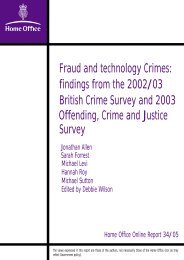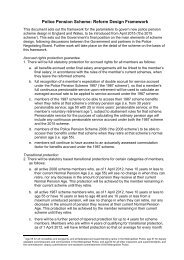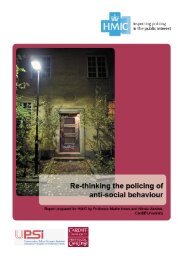Policing Large Scale Disorder: Lessons from the disturbances of ...
Policing Large Scale Disorder: Lessons from the disturbances of ...
Policing Large Scale Disorder: Lessons from the disturbances of ...
You also want an ePaper? Increase the reach of your titles
YUMPU automatically turns print PDFs into web optimized ePapers that Google loves.
Ev w2 Home Affairs Committee: Evidence<br />
Written evidence submitted by Dr Roger Patrick<br />
The recent riots in England appear to be linked to a rise in gang related criminal activity. The evidence<br />
presented suggests that <strong>the</strong> impact <strong>of</strong> Performance Management on <strong>Policing</strong> in <strong>the</strong> UK has been, and still is,<br />
an obstacle to <strong>the</strong> effective implementation <strong>of</strong> strategies to counter this threat to civil society. The police<br />
imperative to improve overall performance in relation to national and force wide priorities has led to an underinvestment<br />
in long term strategies designed to respond to gang related activity. In some cases this has resulted<br />
in <strong>of</strong>ficers being re-deployed <strong>from</strong> deprived areas to more affluent neighbourhoods.<br />
1. The evidence presented is based on a study <strong>of</strong> <strong>the</strong> impact <strong>of</strong> Performance Management on <strong>Policing</strong><br />
over <strong>the</strong> past decade. Some <strong>of</strong> <strong>the</strong> findings, in particular <strong>the</strong> tendency to improve performance by<br />
concentrating resources on activities which are <strong>the</strong> subject <strong>of</strong> performance indicators, may be<br />
pertinent to your inquiry.<br />
2. Investing resources to curtail <strong>the</strong> activities <strong>of</strong> criminal gangs appears a poor investment in such an<br />
environment. I refer to this phenomenon as “skewing”, encapsulated by <strong>the</strong> term “what gets measured<br />
gets done”. This type <strong>of</strong> activity falls under <strong>the</strong> general heading <strong>of</strong> “gaming” and <strong>the</strong> research<br />
concluded that police forces were improving <strong>the</strong>ir overall performance by employing such tactics. A<br />
detailed survey <strong>of</strong> <strong>the</strong> re-organisation <strong>of</strong> <strong>the</strong> West Midlands Police in 1997 highlighted how this<br />
force systematically re-deployed <strong>of</strong>ficers <strong>from</strong> inner city areas to more affluent suburbs (Patrick<br />
2004). Whilst this evidence may be somewhat dated <strong>the</strong> methodology <strong>of</strong> super-imposing police<br />
numbers before and after <strong>the</strong> re-organisation on geographical maps showing levels <strong>of</strong> deprivation is<br />
sound. There is also evidence to suggest this trend is continuing. Tarique Gaffur, a former Assistant<br />
Commissioner <strong>of</strong> <strong>the</strong> Metropolitan Police Service, suggested that a strategy to respond to <strong>the</strong> threat<br />
posed by gangs by concentrating police resources on <strong>the</strong> deprived areas <strong>of</strong> <strong>the</strong> capital had not<br />
been implemented as “it would have taken <strong>of</strong>ficers away <strong>from</strong> <strong>the</strong> politically favoured policy <strong>of</strong><br />
neighbourhood policing” (The Sunday Times 14 August 2011). Councillors in <strong>the</strong> Ladywood Ward<br />
<strong>of</strong> Birmingham recently disclosed that <strong>the</strong> Local Police Command Unit responsible for policing <strong>the</strong><br />
areas affected by <strong>the</strong> recent riots had seen <strong>of</strong>ficer numbers reduced by seventy when <strong>the</strong> force<br />
restructured in 2010.<br />
3. Whilst it was difficult to gain access to <strong>the</strong> detailed information on police deployments to replicate<br />
<strong>the</strong> mapping exercise for every force in England it was possible to gain fur<strong>the</strong>r information on<br />
“skewing” <strong>from</strong> <strong>of</strong>ficial reports, some accessed under <strong>the</strong> provisions <strong>of</strong> <strong>the</strong> Freedom <strong>of</strong> Information<br />
Act.<br />
4. Her Majesty’s Inspector <strong>of</strong> Constabulary reported on <strong>the</strong> dangers <strong>of</strong> “skewing” as early as 1999 and<br />
viewed <strong>the</strong> practice as unethical:<br />
“The drive for continuing improvements in detections should, however, be controlled to ensure<br />
high volume crimes are not unnecessarily pursued at <strong>the</strong> expense <strong>of</strong> proper investigation <strong>of</strong><br />
more serious crime. There was evidence in one force that a divisional commander refused to<br />
allow his detectives to put more than minimal resources into a serious sexual crime<br />
investigation, preferring instead <strong>the</strong>y concentrate <strong>the</strong>ir efforts on less serious crime such as car<br />
<strong>the</strong>ft. This occurred because whe<strong>the</strong>r <strong>the</strong>y solved a rape or <strong>the</strong> <strong>the</strong>ft <strong>of</strong> a car radio, <strong>the</strong> division<br />
would only be credited with one detection.” (HMIC 1999:20)<br />
5. The deaths <strong>of</strong> Police Constable Malcolm Walker in 2001 and Letisha Shakespeare and Charlene Ellis<br />
in 2003 exposed <strong>the</strong> vulnerability <strong>of</strong> <strong>the</strong> West Midlands Police to respond to <strong>the</strong> rise in gang related<br />
criminality. The force had been warned about “skewing” by Her Majesty’s Inspectorate <strong>of</strong><br />
Constabulary (HMIC) in 2001 (HMIC/WMP 2001:2). Similar deployment trends were apparent <strong>from</strong><br />
<strong>the</strong> reports on Nottinghamshire Police following <strong>the</strong> Chief Constable’s declaration that his force<br />
could not cope with a rise in murders (The Times newspaper 14.3.2005):<br />
“Resources were devolved to <strong>the</strong> BCUs Officers and staff were realigned with community<br />
beats and response teams. Detective capacity at headquarters was reduced and this included <strong>the</strong><br />
disbandment <strong>of</strong> <strong>the</strong> Force Drug squad. In March 2003 HMIC noted some aspects <strong>of</strong> <strong>the</strong><br />
reorganisation had not been handled well and <strong>the</strong> challenges were exacerbated by a rise in<br />
serious crime, both in terms <strong>of</strong> drug-related gun crime and an abnormal level <strong>of</strong> murders<br />
committed in 2002.” (HMIC/Notts. April 2005 unpublished)<br />
6. The rise in organised crime, particularly gang and gun related activity, resulted in HMIC undertaking<br />
a <strong>the</strong>matic study <strong>of</strong> this threat (O’Connor 2005). This report could only commend three forces, Avon<br />
and Somerset, Greater Manchester Police and <strong>the</strong> Metropolitan Police Service for <strong>the</strong>ir investment<br />
in measures to counter more serious crime. However concerns about “skewing” continued to be<br />
expressed by operational <strong>of</strong>ficers:<br />
“Every borough is playing <strong>the</strong> game; those that are not are seen as under-performing. <strong>Policing</strong><br />
has completely lost its way. We only investigate crimes that matter in terms <strong>of</strong> performance<br />
data.” (Police Federation Conference 2007)<br />
7. Evidence <strong>of</strong> this type <strong>of</strong> “gaming” activity was also apparent in a number <strong>of</strong> investigations conducted<br />
by <strong>the</strong> Independent Police Complaints Commission (IPCC). These included <strong>the</strong> investigation <strong>of</strong><br />
Derbyshire Police’s response to <strong>the</strong> brutal beating and robbery <strong>of</strong> <strong>the</strong> riding instructor Tania


